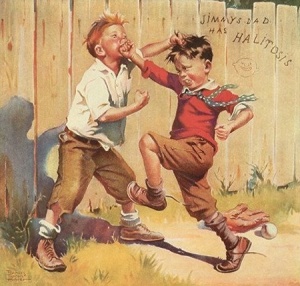In my chosen profession, I have ample and unfortunate opportunity to witness the formation and display of hyper masculinity in its rudimentary and developing form. On a daily, if not hourly, basis I hear boys throw around, with unselfconscious ease, words like faggot, gay, slut, and whore. They claim they could beat up anyone they want, sometimes that includes me, and that they could have sex with anyone they want, this does not include me.
On one occasion, a student asked me, “Sir, are you gay?” because I told him off and issued him with a detention for calling another student a faggot. I told him that if condemning pejorative, subjugating and oppressive language was a feature of homosexuality then it sounds like a favourable lifestyle to me. I expanded on that by declaring that homophobia was on a par with racism . Subsequently, he told me that homophobic language was not as bad as racist language. He could not explain why or how he came to this conclusion. A couple of days later he told me he had discussed the incident with his mum and that she had agreed with him that homophobic language was not as bad as racist language. Another student called me a cunt because he took out a can of Coke in my lesson and I confiscated it. He failed to see this language as being pejorative in relation to women. He didn’t get the can back; I drank it after class. On yet another occasion, I became embroiled, as a peacekeeper, in a physical fight between two male students as they threw insults at each other, calling each other’s mums fat and ugly and their dads gay. This was due to an ongoing feud between the families.
In short, in my experience, a large number of male students have absolutely no qualms about using homophobic and/or sexist language and resorting to violence to attempt to solve their petty, childish squabbles. These are some tell tale signs of hyper masculinity and not, as so many continue to define it, instances of boys being boys.
What is Hypermasculinty?
The term hypermasculinity is believed to have been established by Ashis Nandy in his writings on colonialism and gender in the 1980s. The term is widely used in the social sciences and has evolved in meaning, but no standard definition exists. Essentially, hypermasculinity is the adoption of extreme macho traits in males. One of the first studies of hypermasculinity was conducted by Donald L. Mosher and Mark Sirkin in 1984. They utilised Silvan Tomkins’ script theory to divide the overtly macho personality constellation into three separate behavioural dispositions: (1) entitlement to callous sex; (2) violence as manly, and (3) danger as exciting.
What Are The Origins of Hypermasculinity?
There are various theories about the sources of these overly masculinised traits. One such theory, is the hormonal hypothesis. According to this theory, hormones such as testosterone can alter the ways in which neural pathways are constructed and contribute to some of the masculinisation or feminisation of individuals. Overly masculine males, are believed to have been exposed to inordinate levels of prenatal testosterone during foetal development.
In conjunction to the hormonal hypothesis, script theory focuses on the effect the social environment in which one grows up has on your development. The macho or hypermasculine script organises childhood experiences to favour “masculine” traits such as physical strength and stoicism over “feminine” traits such as emotion and nurturing. Additionally, this hypermasculine socialisation is perpetuated by rites of passage in male social networks such as hazing, and enculturation by mass media such as advertisements. The script of the overtly macho man descends from the ideology of the warrior and the stratifications this endorses. The warrior is the victor, master, head of the house, with a woman as his complement, he is the patriarch and owns his children.
How Does Hypermasculinity Manifest Itself?
One does not have to search long and hard to find instances of hypermasculinity. This morning, I visited the Guardian website to see what I would uncover. I found that a 19 year old man had been found guilty of stabbing and killing another man in what is believed to be a gang related brawl in London. I read that a man in Birmingham had been jailed for shaking and killing his partner’s child. I read a story of the murder of a woman and her two year old daughter at the hands of her ex partner. He murdered them after the woman left him due to the abusive nature of their relationship and she refused to rekindle the romance. She did not attempt to deny him access to their two year old daughter. He tortured her for four hours with implements he had brought with him for such a purpose before shooting both her and their two year old daughter to death.
There is also evidence of hypermasculinity on an international scale. For instance, three men have been sentenced to death in India for the gang rape of a photojournalist in Mumbai last year. They are also among five men sentenced to life last month for raping another woman in a separate incident in the city. Cast your mind back to George W. Bush’s speech in the aftermath of 9/11 when he announced with almost sadistic glee that he would “smoke out” those responsible for the atrocity and bring them to justice “dead or alive”, as if he were a self-righteous gun slinging sheriff in an outdated Hollywood Western. Witness Kim Jong-Un’s constant warmongering and violence threatening rhetoric he spouts against the United States and South Korea. This list is not exhaustive. Some statistics show the breadth of the issue: 95% of the prison population in the world is male and 75% of suicides are male, usually under the age of 35.
What Can Be Done About Hypermasculinity?
It is at once simple and extraordinarily complicated. Simple in that masculinity must be redefined. Complex in how to achieve this goal. Masculinity in its current form is extremely narrow and more or less redundant in a modern world in which the social roles of men and women have shifted so comprehensively since universal suffrage. Undoubtedly, masculinity needs to be redefined and modernised for the benefit of both men and women worldwide. What needs to comprise this new masculinity? In his closing speech at the recent inaugural Being a Man festival in London, Grayson Perry outlined his opinion on the matter: ” We men ask ourselves and each other for the following: the right to be vulnerable, to be uncertain, to be wrong, to be intuitive, the right not to know, to be flexible and not to be ashamed.” These seem like valuable goals, that would be beneficial to any person. At the same time, established masculine characteristics should not be wholly discarded. Features such as honour, loyalty and hard-work amongst others should be rightly celebrated and incorporated into this new masculinity. And how to engender this new masculinity? This section of my blog will explore this very question in the future. It will analyse gender issues and masculinity on a micro-level such as family relationships and a macro-level such as institutions.


